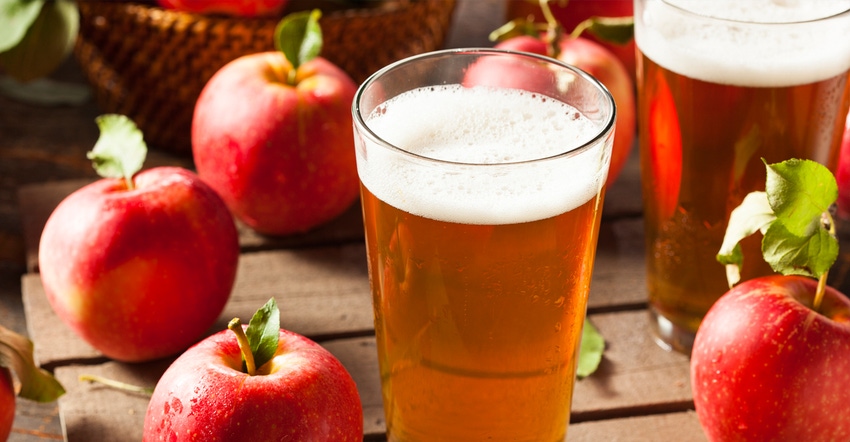
Back in granddad’s day, apple growers just pressed and fermented juice from off-grade apples into small batches of plain cider to be sold at farm stands. Today, grandsons and granddaughters are tapping a fast-growing, value-added market with “higher octane” brews and competing with craft beers in far larger markets.
Cider is the U.S. beverage industry’s fastest-growing segment, according to the IRI market research firm. From 2013 to 2014, cider sales grew 75.4%. Over the past three years, sales have quintupled.
The United States Association of Cider Makers estimates as many as 400 small businesses and companies make cider now. As you might suspect, California, Michigan, New York, Pennsylvania, Oregon and Washington are the top six states for cideries — and apple production.
What spurred this growth?
In December 2015, Congress passed the “CIDER Act,” which was “a huge step forward for cider makers,” according to Mike Beck, an apple grower from St. Johns, Mich., and USACM president. That law allowed hard cider to be produced with a higher alcohol content and carbonation, and taxed at a low beverage rate. Pear cider gained the same advantage.
Growth of the craft beer segment paved the way and highlighted the growth in employment and net tax revenues. Pennsylvania alone saw $25.6 million in cider sales in 2016 from state-licensed cideries.
Sales and production also received a significant boost from legislation signed by Gov. Tom Wolf last year, providing new avenues for public sector support of Pennsylvania’s wine, craft beer and distillery industries. “Governor Wolf and the legislature recognized the potential of popular products like cider for increasing farm revenues, and the need to broaden producers’ ability to market their products to meet consumer demand,” says Russell Redding, Pennsylvania’s ag secretary.
“We now have 43 cideries statewide, up from 15 just two years ago,” he says. “Existing producers are expanding their product lines, and new businesses taking advantage of Pennsylvania’s abundant apple orchards to launch new production.”
New Farm Show competitive event
Cider is no longer just plain old cider. Pennsylvania Farm Show-goers will be able to check out — maybe even sample — winning entries of the first Home-grown Hard Cider competition. In late November, Ron Sansone from Middletown, Ct., Dan Pucci from Brooklyn, N.Y., and Meredith Collins from Ithaca, N.Y., judged 26 entries from licensed Pennsylvania cideries.
Winning entries in seven categories will be announced Jan. 6 during the farm show. Today’s ciders are becoming specialty products. For instance, here’s a list of the competitive categories:
• Modern cider. Made primarily from culinary or table apples
• Heritage cider. Made from multi-use or cider-specific bittersweet or bittersharp apples, with wild or crab apples sometimes used for acidity or tannin balance
• Sour cider. Produced with varieties and production techniques for a profile similar to traditional Spanish ciders
• Fruit cider. Made with added fruits or juices
• Hopped cider. Produced with added hops
• Spiced cider. Combinations with cinnamon, nutmeg, allspice and other spices
• Wood-aged cider. Barrel-fermented or barrel-aged for a notable overall flavor profile
About the Author(s)
You May Also Like




